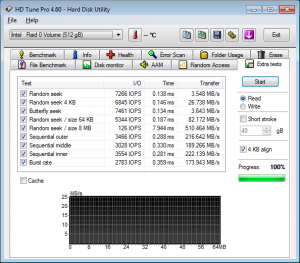
My last 3 or 4 builds have had raid 0 in them. M.2 nvme drive also goes at pcie x4 speed. They both significantly outperform a single drive of the same make/model. My 8350 system in my sig has 2 raid 0 drives in it. I have not had it happen, guess I am just lucky. Yes you need to deal with either drive failing. So a decent raid controller can scale way paste just a few drives.
#RAID 0 SSD BENCHMARK SOFTWARE#
If speed is important, and MMO/RPG games can very much benefit from much higher texture load rates raid 0 is a good idea.Ī good PCIE based raid controller will do much better then an on-board or any software raid solution.Ī single sata 3 connection can do at best 6 Gb/s if the drive can even go that fast.Īn x4 3.0 PCIE Raid controller can do 3.94 GB/s However I dont know if the benefits of a SSHD will still be there with a RAID 0 array of those drives? Maybe somebody else can chime in on that? The hit from software RAID 0 on a higher end box will be negligible. If the processor in the machine is a high i5 or i7, I would probably RAID them. I was able to swap chassis and keep my RAID 0 array long ago, since they were connected to a promise card, that was nice. Going from one machine to another, you couldnt take the array with you without backing it up. Software RAID I dislike, for the simple fact that you cant really move it. I had one corrupt one time, but that was because I was pushing the PCI bus out of spec overclocking while using a promise controller. Luckily I have never had a RAID array fail.

I have been using RAID since the promise controller days and have never had an issue with it. Were they possibly talking about RAID 1? RAID 1 (mirroring) you will get basically double the read, but writng is unchanged, this is because its able to read from both disks, but mirrors writing to both for redundancy (in case a drive fails). I have NVMe RAID 0 and this is definitely faster than a single NVMe drive (see photo). In the case of RAID 0, your speed will infact increase, NVMe or not. The same could be said when we tested in PCMark 8with a top score of 5084 and transfer speed of 583MB/s, much lower than one might expect from a 14GB/s RAID configuration.Also not sure where this comes from. Not only does it have a preset SSD benchmark, but also, it has included such things as endurance testing and threaded I/O read, write and mixed tests, all of which are very simple to understand and use in our benchmark testing. The benchmark displays test results for, not only throughput but also, IOPS and Disk Access Times. pushing the limits of our software.Īnvil’s Storage Utilities (ASU) are the most complete test bed available for the solid state drive today. We see much the same with Anvil Disk Utility below…. Transfer speeds are displayed on the left with IOPS results on the right.Īll in all, we weren’t really impressed with AS SSD results as the IOPS remained at a mil IOPS that we had seen previously, with throughput only jumping up 2GB/s, unlike that of what Crystal Diskmark displays. For the most part, AS SSD tests can be considered the ‘worst case scenario’ in obtaining data transfer speeds and many enthusiasts like AS SSD for their needs. The toughest benchmark available for solid state drives is AS SSD as it relies solely on incompressible data samples when testing performance. Performance is virtually identical, regardless of data sample so we have included only that using random data samples.Īs much as we would always like to see those low 4k read and write speeds improve at the industry level in general, 14Gb/s read and 12GB/s write when looking at incompressible data is pure lightning.

Crystal Disk Benchmark is used to measure read and write performance through a sampling of random data which is, for the most part, incompressible.


 0 kommentar(er)
0 kommentar(er)
